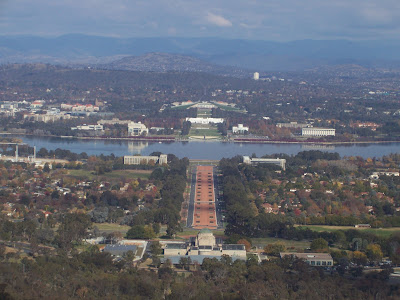Woke up extremely early for the 3 hour drive to Canberra (pronounced in Australian like Can- bra), the capital of Australia. Many people, including a friend from Canberra, have discouraged me from going to the city. Canberra only has a small spread out population of about 340,000 compared to Sydney's 4.5 million. It's known as the bush capital because it is surrounded by bushland, and wildlife can wander into the city from time to time.
Canberra started as a city in the early 1900s as a result of a long held dispute between Sydney and Melbourne, both of whom wanted to be the capital. As a compromise, Canberra was planned in the center between the two much larger cities, with Sydney to the north and Melbourne to the south. It's no big city like Sydney or Melbourne, but it is definitely a must see in Australia, especially since it's the governmental center of Australia.
The arduous journey brought us to Mount Ainslie, where I had my first true glance of Canberra's Central Business District. The monuments were wonderfully sprawling out before me. The Australian War memorial was closest, and just behind it was the Old Parliament building and the New Parliament building. To the right I could see the mint, where Australian Dollars are printed, and the Captain Cook Memorial Jet, which spewed water meters into the air.
Following the descent from the mountain, we drove by all the foreign embassies. Each had buildings that resembled their country's culture. China's was stereotypically Chinese , and the American one looked sort of like a brick prison, which I guess somehow represents America.
Past the embassies was the Parliament House, built right into a hill. The building was an elaborate modern show of the wealthy nation of Australia. It took almost six times the concrete as the Sydney Opera House to build and cost $1.1 billion Australian dollars!
Inside Parliament we were greeted by a large granite foyer, followed by a great hall. This hall held the 2nd largest tapestry in the entire world, based on a painting by Arthur Boyd. The Senate and House of Representatives were further along from the great hall. The House of Representatives is covered in green just as the lower house in England, but with a lighter Eucalyptus coloured green to represent Australia.
The Senate room was red like the upper house in England and featured a seat for the queen to sit in or for her Australian representative.
Government in Australia operates much like the British system. The citizens vote for parties and then the winning majority party picks the Prime Minister. The Prime Minister serves as long as his party wants him or until his party loses the majority. In Australia, voting is compulsory; any citizen who does not vote, even if abroad, faces a hefty fine.
 The Australian Seal featuring the Kangaroo and Emu,
The Australian Seal featuring the Kangaroo and Emu,both of which are only in Australia and do not go backwards,
The 7 pointed star represents the 6 states and the Northern Territory
We went from Parliament to the National Museum of Australia. It had an entire history of the continent of Australia, starting with the oldest civilisation in the world, the aboriginals. It ended near the present day and included a really cool film that brought you through thousands of years of Australian history in ten minutes while enclosed within a moving room.


Preserved body of the now extinct Tasmanian Tiger
The Museum itself was whimsically designed and featured a tongue like object that pointed towards Parliament and then towards Uluru, representing the unity of Australian and aboriginal society.
 The tongue
The tongueThe Australian War Memorial is regarded as one of the most significant memorials dedicated to soldiers in the entire world. The architecture is beyond breathtaking, influenced by Byzantine architecture, and Art Deco. It serves mainly to honour fallen soldiers. The battle of Gallipoli marks the first major ANZAC (Australian and New Zealand Army Corps) participated battle. For this reason, ANZAC day is celebrated every April 25th and is a majory memorial holiday in Oz.
 Australians are obsessed with large things;
Australians are obsessed with large things;I wouldn't be surprised if this was the largest sheep in the world
Now back to the city!
Jono












No comments:
Post a Comment